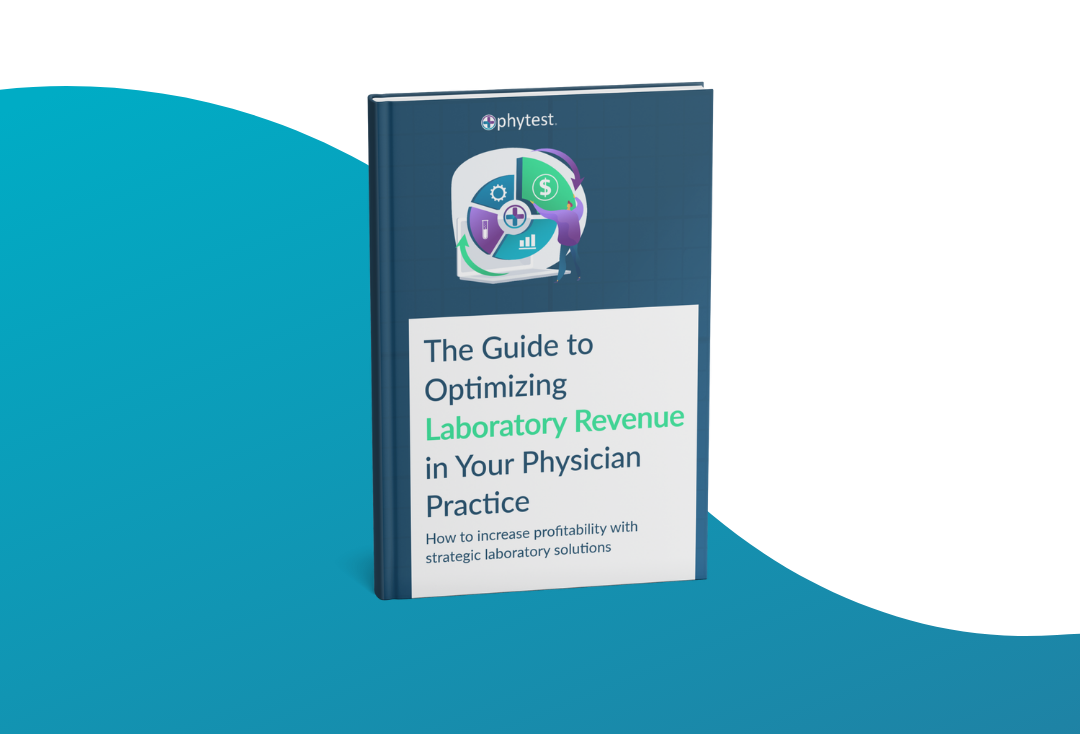8 Things to Know About Physician Billing Guidelines for Laboratory Services

Billing for laboratory services is a crucial piece in the healthcare system that has only grown in complexity over the last decade. Trends such as labs shifting from COVID-19 and the rise of pharmacogenomic testing are leaving labs of all specialties concerned with remaining profitable.
Physician billing guidelines for laboratory services are adjusted every year by the Center for Medicare and Medicaid (CMS), in addition to commercial payer-specific requirements for a range of specialty lab testing. Understanding these guidelines within the laboratory billing cycle will help physicians and laboratories alike best determine the billing environment for their facility. As experts in the laboratory reimbursement space for over 25 years, here are 8 essential topics to know about physician billing guidelines for laboratory services.
ON THIS PAGE
- Types of Laboratories
- Highlights of the Physician Billing Process for Laboratory Services per CMS Guidelines
- Medical Necessity
- Modifier Usage
- Bundling and Unbundling Tests
- Compliance and Ethical Imperatives in Physician Billing Guidelines for Laboratory Services
- Coverage Policies
- Reimbursement Challenges
1. Types of Laboratories
Physicians can utilize a range of laboratories for their services, depending upon their specialty. Guidelines for billing for laboratory services can differ by type depending upon complexity of the test and how it was processed, some types of labs including the following:
Independent Laboratories
Independent laboratories operate as standalone facilities, providing a wide range of diagnostic tests and services. They often serve multiple healthcare providers and offer a convenient location for patients to undergo tests.
Hospital Laboratories
Hospital laboratories are an integral part of healthcare institutions. They primarily serve the in-house diagnostic needs of the hospital’s patients, offering quick turnaround times for critical tests.
Reference Laboratories
Reference laboratories specialize in complex and specialized testing, often serving as a resource for healthcare providers who require advanced diagnostics. They offer a broader range of tests and expert interpretations.
Public Health Laboratories
Public health laboratories focus on testing related to public health concerns, including infectious disease surveillance, environmental testing, and emergency response.
Physician Office Laboratories (POLs)
Physician Office Laboratories, or POLs, are small-scale labs located within physician offices. They primarily perform routine tests, enabling quicker diagnoses and treatment planning.
Clinical Laboratories
Clinical laboratories encompass a broad spectrum of labs found in various healthcare settings. They handle routine as well as specialized testing and play a pivotal role in patient care.
Mobile and Travel Phlebotomy Laboratories
The day-to-day activities of a mobile phlebotomist involve traveling to various locations to collect blood samples from patients. This includes setting up a portable phlebotomy station, explaining the procedure to patients, and safely and accurately collecting blood specimens.
2. Highlights of the Physician Billing Process for Laboratory Services per CMS Guidelines
Billing for laboratory services necessitates a structured approach to ensure proper reimbursement and adherence to healthcare regulations per chapter 16 of CMS Medicare Claims Processing Manual. These guidelines offer a comprehensive framework for physicians billing for laboratory services, including crucial aspects like medical necessity, accurate CPT coding, and compliance with payer policies.
1. Medical Necessity: The foremost consideration when ordering laboratory tests is medical necessity. Physicians should only order tests that are clinically relevant and necessary for diagnosing or managing the patient’s condition. Ordering unnecessary tests can lead to billing denials and increased healthcare costs.
2.Precision in CPT Codes: As earlier emphasized, each laboratory test is associated with a specific CPT code. Physicians must be well-versed in CPT codes and stay abreast of any updates or changes. Accurate code assignment is foundational for billing accuracy.
3. Billing Formats: Laboratory service billing can assume various formats, including fee-for-service, bundled payments, or capitation. The chosen format should be aligned with the healthcare provider’s contractual agreements with payers and conform to regulatory mandates.
4. Diligent Billing Documentation: The billing process necessitates meticulous documentation. Key components include the patient’s demographic information, the date of test ordering, the physician’s details, the assigned CPT codes, and any relevant modifiers providing additional context.
5. Adherence to Payer Policies: Different healthcare payers often enforce specific policies and guidelines for laboratory billing. Physicians and their billing teams must familiarize themselves with these policies to ensure that claims are accurately submitted.
6. Scrutinizing and Submitting Claims: Prior to submission, claims for laboratory services should undergo rigorous scrutiny to confirm their accuracy and completeness. Any identified errors or discrepancies should be addressed proactively to prevent claim denials or reimbursement delays.
7. Active Follow-Up: Post-claim submission, healthcare providers should engage in proactive follow-up with payers to monitor the claims processing status. Timely resolution of any denials or rejections is essential for addressing billing issues promptly.
3. Medical Necessity
It’s essential to ensure that medical necessity is clearly documented in the patient’s medical records to support the billed services. We have seen that labs running genetic test menus often struggle most with understanding that reimbursement is not guaranteed with some test menus from federal and commercial payers without proper documentation stating medical necessity. Failing to establish medical necessity may result in denial of coverage, leaving patients responsible for the full cost of testing, and labs chasing down this payment.
4. Modifier Usage
Modifiers are additional codes used to provide more information about the services rendered. They clarify specific aspects of laboratory services, such as the location where the service was provided or the circumstances surrounding the test. Laboratory modifiers are categorized into two main groups: informational modifiers and pricing modifiers.
Informational Modifiers: These modifiers convey information about the circumstances under which a test was performed. Common informational modifiers include:
-
- 24: Unrelated evaluation and management (E/M) service by the same physician or other qualified healthcare professional during a post-operative period.
- 25: Significant, separately identifiable E/M service by the same physician or other qualified healthcare professional on the same day of the procedure.
- 32: Mandated services.
- 91: Repeat clinical diagnostic laboratory test.
Pricing Modifiers: These modifiers may affect the reimbursement rate of laboratory tests. Examples of pricing modifiers include:
-
-
- QW: CLIA-waived test.
- 76: Repeat procedure by the same physician.
- 77: Repeat procedure by another physician.
-
5. Bundling and Unbundling Tests
Bundling and unbundling of laboratory test codes and claims refer to the process of grouping or separating individual laboratory tests for billing purposes. This practice has significant implications for healthcare providers, payers, and patients in terms of cost, reimbursement, and compliance.
Bundling: Bundling involves grouping together related laboratory tests or services under a single billing code or claim. This is typically done when multiple tests are performed as part of a standard panel or profile. Bundling simplifies the billing process, reduces administrative overhead, and often results in a lower overall reimbursement rate compared to billing each test individually. Bundling is common for routine laboratory tests or commonly ordered panels, such as a comprehensive metabolic panel (CMP) or a complete blood count (CBC).
Unbundling: Unbundling, on the other hand, involves billing for individual laboratory tests separately, even if they are typically performed together. This practice may occur when providers or laboratories attempt to maximize reimbursement by billing for each component of a bundled test separately. Unbundling can lead to higher reimbursement rates for providers but may be considered fraudulent or abusive if done inappropriately. Unbundling may also occur when a specific test is performed in addition to a bundled panel but is not included in the bundled code.
6. Compliance and Ethical Imperatives in Physician Billing Guidelines for Laboratory Services
In addition to adhering to billing guidelines, physicians must uphold the highest standards of ethical and compliance conduct when ordering and billing for laboratory services. Key considerations include:
Stark Law and Anti-Kickback Statute
Physicians should maintain a keen awareness of federal laws such as the Stark Law and the Anti-Kickback Statute. These regulations prohibit improper financial relationships between healthcare providers and laboratories. Referrals for laboratory services should solely be driven by medical necessity, not financial incentives.
No Surprises Act
The No Surprises Act aims to shield patients from surprise medical bills resulting from out-of-network care, including laboratory services. Physicians and healthcare providers must be aware of the provisions of this act, which include dispute resolution processes and cost transparency requirements.
Vigilance Against Fraud and Abuse
Billing for services that were either not performed or deemed medically unnecessary constitutes healthcare fraud. Physicians are duty-bound to ensure that all claims submitted for laboratory services are backed by accurate documentation, upholding the highest ethical standards. Physicians must also be keenly aware of avoiding fraudulent practices surrounding abuse of contracts and improper use of pass-through billing.
7. Coverage Policies
Understanding insurance coverage policies is paramount for successful reimbursement. Coverage policies vary among payers and can impact the reimbursement process significantly. It’s essential to stay updated on changes in coverage policies to avoid claim denials and delays. It’s crucial to recognize that these policies can vary significantly not only from state to state but also among different payers. This diversity in coverage policies poses a challenge for laboratories seeking reimbursement for their test menus.
8. Reimbursement Challenges
Despite efforts to adhere to billing guidelines, laboratories and physicians may encounter various reimbursement challenges. These challenges can include claim denials, delayed payments, and changes in reimbursement rates.
Over the years, we have largely seen that both physicians or labs alike struggle to keep up to date on these constantly changing guidelines and requirements from payers and CMS alike. The challenge for one Billing Manager or Physician to effectively run billing for their laboratory claims whilst also staying informed on these changes often results in lost revenue and increased errors.
Often, we speak with labs that are even completely unaware of these guidelines and either have acquired large amounts of A/R before seeking help, or labs that have trusted their billing processes in the hands of billing companies that fail to understand the complexities themselves.
Finding the right billing environment for laboratories of any specialty must incorporate best practices to ensure compliance and regulations are met by the physician billing guidelines for laboratory services. Outsourcing your lab’s billing and revenue cycle management to a trusted expert in lab billing can be a valuable asset to increasing revenue. Consider partnering with a lab billing company like Phytest where precision meets profitability, and compliance is the cornerstone of success.
STAY UPDATED ON NEWS & BLOGS
Ready to maximize your lab revenue?
FOLLOW US
Discover How You Can Earn More Revenue
With Laboratory Reimbursement Experts
We help your practice or laboratory identify and implement one of a kind solutions to maximize your laboratory services revenue.
Read Our Latest Posts
Genomic Lab Billing 101
ON THIS PAGE Why Genomic Lab Billing Matters What Is Genomic Lab Testing? Key Differences from Molecular Lab Testing Challenges in Genomic Lab Billing and Reimbursement Understanding Genomic Lab Revenue Cycle Management Services How Genomic Lab Billing Services...
How to Choose A True Pathology Billing Company
ON THIS PAGE The Challenges Facing Independent Pathology Labs The Costly Consequences of Choosing the Wrong Pathology Billing Company How to Choose the Right Pathology Billing Company Know What You're Worth: Key Pathology CPT Codes and Reimbursement Rates Switch to a...
Genetic Lab Billing Services for OB/GYN Revenue
ON THIS PAGE The Growth of Genetic and Molecular Testing in OB/GYN PracticesThe Complex Nature of Genetic Lab Billing and Why It Requires ExpertsThe Impact of Molecular Laboratory Billing Services on OB/GYN ProfitabilityPractices That Can Boost Their OB/GYN Revenue...




